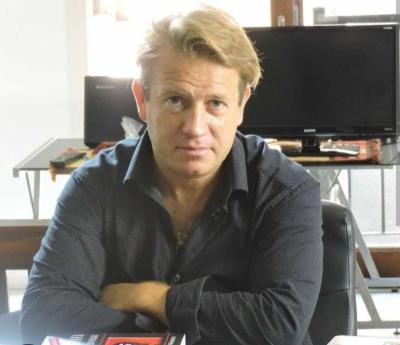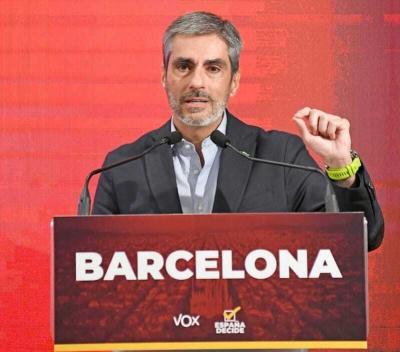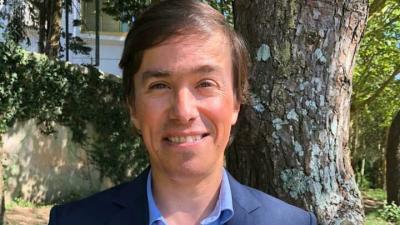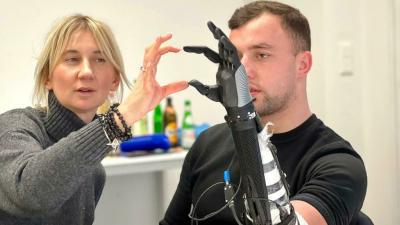Nicolás Márquez: “Allende was a usurper of power who had to be deposed by force because he was surrounded by terrorists and foreign agents”.
Interview with Nicolás Márquez, essayist and political analyst. He is a graduate of the Faculty of Law of the National University of Mar del Plata and the Faculty of Communication Sciences of FASTA University, as well as the Center for Hemispheric Defense Studies (National Defense University in Washington DC). He has published 12 books, including “El libro negro de la nueva izquierda” (written with Agustín Laje) and “La máquina de matar – Biografía definitiva del Che Guevara”. We are talking about his latest book, “The Communist Dictatorship of Salvador Allende”.
Alvaro Peñas: Why a book about Salvador Allende?
Nicolás Márquez: I have written several biographies of different characters on whom the Left has built myths and lies, and has turned them into secular saints by omitting things, hiding them, disguising or misrepresenting. An emblematic case is my biography of Che Guevara. I have always been very interested in the Chilean case and was shocked by how someone so regrettable, who was a disgrace for Chile, was later vindicated, venerated and excused. The new generations do not know who he was - which is why they end up voting for the Communist Party, as happened in the latest presidential elections. The adulteration of the past has consequences in the present. When I realised that in Chile there had been polarisation, a very strong rift where the right had become more right-wing with the Republican Party and where the centre-left was finished with the appearance of Boric and his Frente Amplio, I realised that it was necessary to combat the hegemonic propaganda. This year is the 50th anniversary of the suicide of dictator Allende, and it seemed important to me to write a book and disseminate it as widely as possible for the new generations to be able to contrast a little in this cultural battle, which also includes a battle for the past.
The images of Salvador Allende, submachine gun in hand, in the Casa de la Moneda have been used to turn him into a kind of hero, a myth like Che.
The Left wasted no time in lying about Allende’s death. For example, it has been indisputably and unanimously proven by all the experts that Allende committed suicide, but from the very first moment Fidel Castro, García Márquez and the entire international Left lied that he had been assassinated by General Pinochet’s troops. The military, who rose up with complete legitimacy because Allende had become a dictator outside the law and the Constitution and had to be removed from office, offered him four times the possibility of leaving the country with his family wherever he wanted. And so they did, his whole family was evacuated to the country of his choice, but Allende decided to stay in the Casa de la Moneda and commit suicide. Somehow he wanted to escape from himself, from the disaster he had made in Chile, from his political responsibility, after having drunk four glasses of whisky to find courage. There was nothing heroic about his death.
You say that Allende had become a dictator, but he is usually presented as a democrat. How did Allende become a dictator?
Allende was already a paid agent of the KGB in 1961 and in those years he stayed in Cuba several times with Fidel Castro and Che. He was also the leader of the Latin American Solidarity Organisation (OLAS), an international conclave with 482 communist delegates in Havana that sought to promote guerrilla warfare and terrorism throughout the continent. In fact, his government from 1970 to 1973, the Unidad Popular, included the Communist Party, which was undemocratic and dependent on the Soviet Union, and was financed by the Kremlin. Allende belonged to the Socialist Party, which at that time was to the left of the Communists because it was firmly in favour of revolution and guerrilla warfare. It also had a paramilitary structure, the MIR, made up of 10,000 terrorists led by his nephew Pascal Allende. The MIR was involved in organised crime, urban and rural guerrilla warfare, and armed confrontation with the carabineros and the military. It is true that Allende came to power legitimately, like Perón, Hitler or Chávez, but coming to power legitimately does not guarantee that the exercise of that power was legitimate, and in fact it was not: He subjugated state institutions; he trained and financed the guerrillas; he organised a presidential guard made up of Cuban agents and MIR guerrillas, in fact there were thousands of Soviet, Cuban and other guerrilla organisations’ agents all over the country; he attacked property rights through confiscations at gunpoint and paralysed the judiciary. It was a system that crushed liberties and the division of powers, but unlike other totalitarian figures Allende failed because he only had the support of a third of the population. He was not the “people’s president” and that is why he did not succeed in making the revolution. He was an authoritarian dictator who could not become a totalitarian dictator like Fidel Castro. Moreover, the Congress, the Accounting Office and the Supreme Court of Chile determined in mid-1973 the illegitimacy, illegality and unconstitutionality of Allende‘s rule. He was a usurper of power who had to be deposed by the military because he was surrounded by terrorists and foreign agents.
So is the “coup d’état” a reaction to that usurpation?
Some call it that, but many use the term “military pronouncement”, which I think is more appropriate. It was the state institutions that ordered the armed forces to intervene and guarantee the order that was being violated and subverted by Allende. Moreover, he was offered guarantees, but he chose to commit suicide. The military wanted to remove him from office and expel him from Chile, just as they had done with his family.
Where did Allende’s family go into exile?
Most of them went to Cuba. In fact, the Boric government has brought a granddaughter of Allende from Cuba and has given her a ministerial position to lead the armed forces. A biologist leading the armed forces! This means that the government had no interest in the armed forces except to humiliate them by putting Allende’s granddaughter in charge.
Allende, like Che, did not hide his ideology; it is the later myth that makes him a democrat.
In 1953, when Stalin died, Allende made a speech of apology for him together with Pablo Neruda, and it was there that his ideas and idols became clear. Then, in 1971, the genocidal Fidel Castro went to lead the revolution in Chile for a month, meeting with the guerrillas and attacking the opposition. The link could not be clearer. There was also Soviet financing in the presidential campaign and in the government of the Unidad Popular, which was economically a disaster as always happens with communist countries: shortages, famines, massive expropriations... It was a regime very similar to what we have today in Venezuela: a caricature of democracy with political parties that did not operate or were semi-banned, and democratic institutions that only existed formally. It was a road to Cuba that never happened for lack of effective political power. Lenin said that making a revolution with a minority is not a mistake, it is a political crime, but Allende did not listen to him.
You have toured Chile several times to present your book. What do they know in Chile about Allende?
Allende has a tremendous media campaign on his side and the government is also preparing commemorations for 11 September. I don't know what they want to pay homage to: his suicide, his dictatorship, his economic failure, or having subjected Chile to the Soviet yoke, but what is certain is that they idolise him. Despite this, when a recent poll on the best government in Chile's recent history was published Allende got 20%, and the demonised Pinochet 26%, which makes me think that the propaganda is beginning to crumble. My book is a bestseller. It was presented by José Antonio Kast at a book fair and I have already toured Chile four times because of the great interest it has aroused. It is clear that a large part of the population wanted to hear something else.
Do you think there is a reaction to all these myths of the Left and that more and more people are looking for the truth?
Yes, and social networks have had a big influence on this because they are an alternative approach to the traditional media. In the case of Che Guevara, we have to take into account the failure of the Cuban revolution, and also the fact that the Left itself has changed the Che Guevara banner for the multicoloured cloth and Che has lost prominence. But after Che Guevara, the biggest lie of the Latin American Left has been that about Allende in order to turn him into a myth. And what is a myth? According to the Royal Spanish Academy, a myth is an object or thing to which qualities are attributed that it does not have, and Allende is attributed qualities that he did not have: he was not a statesman, he was not a good ruler, he was not a democrat, he was not brave, etc. Despite this, historical distortion and propaganda have done a good job. This is why I have written this book, so that Chileans can find an alternative view based on historical facts.
And a few months before the 50th anniversary of his death, isn't that propaganda being redoubled?
Yes, there is a lot of money in propaganda, but the Boric government is doing so badly that it is failing to canonise Allende. Let's remember that he lost the referendum on the new constitution, and the last elections were won by the right wing of Kast and the Republican Party. Boric is going through a bad time and the propaganda about Allende is not succeeding in the public opinion.
Read also
Gonzalo de Oro: "If VOX does not defend the Catalans, no one else will"
Interview with Gonzalo de Oro, VOX councillor in Barcelona City Council and coordinator of the VOX municipal group.
Álvaro Peñas
Interview with José de Carvalho: 'Portuguese history is not a crime'
José António Ribeiro de Carvalho is a history professor and researcher. A regular contributor to national and regional newspapers on politics, ideology and education, he is the author of several books.
Álvaro Peñas
Manuel Veiga Aldemira: "Technology gives a second life to many Ukrainians, some soldiers have even returned to the front"
Manuel Veiga Aldemira: I have been involved in supporting Ukraine since February last year, from the very beginning of the invasion.














Comments (0)